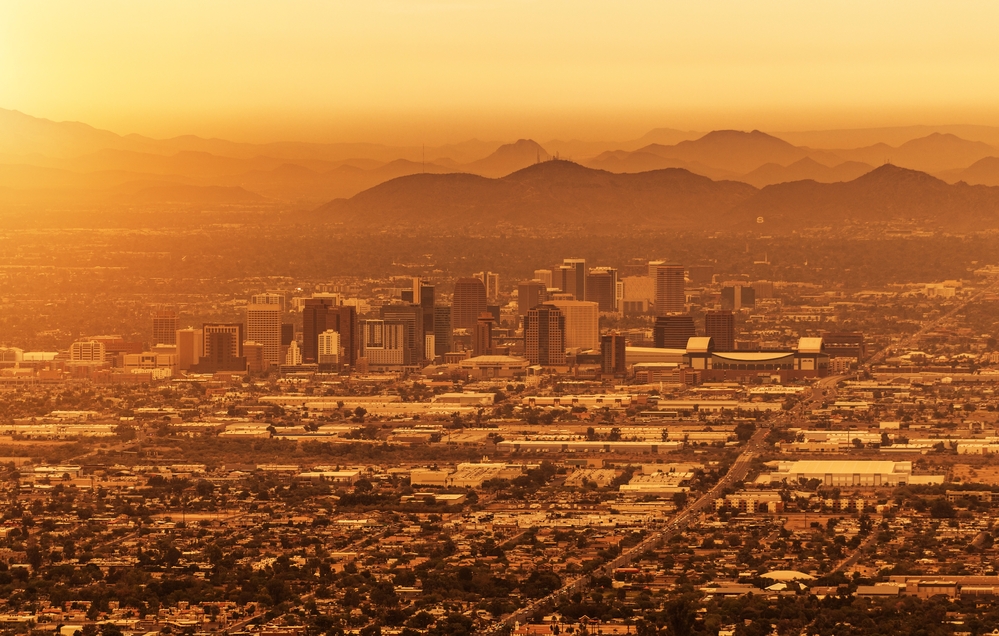Heat Wave Expands From South to Pacific Northwest
Jul 12, 2023

Temperatures of 100 degrees and more hover over major cities of the south and Pacific Northwest. Temperatures in the Southwest have gone beyond 120 degrees in many areas of the region.
Temperatures were predicted to reach 90 degrees in Portland, Oregon and red flag fire warnings have been posted across parts of Oregon and Washington. Excessive heat watches and warnings were pronounced for parts of California, Nevada, and Arizona. Heat advisories were issued in a number of counties across New Mexico, Texas, and Florida. The three most populous states of the country – California, Texas, and Florida –- with a population of 54 million were expecting triple-digit highs this week. The worst has been forecasted for Arizona.
the largest city of the state, could reach temperatures of 110-degree highs, which would break records.
It’s a dry heat in California and the Desert Southwest, which will reach 120 degrees in some spots.
In Texas and Florida, the oppressive heat is combining with stifling humidity that will push the heat indexes to a range that is unhealthy.
The heat wave has been made worse due to its longevity. El Paso is entering the 25 th day in a row with highs tipping at 100 degrees, beating a previous record of 23 consecutive days set in 1993. There is no immediate end in sight.
The sweltering temperatures are due to a heat dome or ridge of high pressure. The dome is expanding and elongating. It is pushing away any inclement weather and diverting storm systems and the jet stream northward over the Upper Midwest, Great Lakes and Canada.
The air under the dome is sinking, heating up and drying out. The condition includes constant sunshine that will heat the air mass even more.
Thursday the stretched-out heat dome will be anchored over California and will stretch from the northeastern Pacific Ocean to Florida. The hottest weather beneath the dome will affect the Gulf Coast, the southern Plains and the Southwest.
The Washington Post heat index has identified the top 10 hottest cities of the country with a population of at least 500,000. They are:
| City | Wed | Thu | Fri | Sat | Sun | Mon |
| Ft. Worth, Texas | 112 | 113 | 106 | 106 | 106 | 106 |
| Mesa, Ariz. | 111 | 110 | 111 | 112 | 112 | 112 |
| Austin, Texas | 111 | 111 | 110 | 109 | 108 | 109 |
| Dallas, Texas | 111 | 111 | 105 | 106 | 104 | 106 |
| Phoenix Ariz. | 110 | 109 | 109 | 111 | 111 | 112 |
| Oklahoma City | 110 | 107 | 104 | 94 | 92 | 94 |
| San Antonio | 109 | 107 | 106 | 106 | 105 | 106 |
| Houston | 109 | 107 | 105 | 106 | 104 | 106 |
| Kansas City, MO | 106 | 97 | 92 | 88 | 86 | 87 |
| Jacksonville, FL | 105 | 107 | 109 | 109 | 109 | 111 |
Power outages can occur during a heat wave due to the strain on the electric grid when everyone cranks up their air conditioners at the same time. Some have said that as many as two-thirds of North America is at risk of an energy shortfall this summer due to the extreme demand for power.
Those in the know of how to prepare for a heat wave warn that you have an emergency kit, sign up for emergency alerts and have directions to the local cooling center as well as a hospital. They also advise that you have misting spray bottles and a cooler full of food if the refrigerator goes down. Battery-operated fans are also suggested.
When the power goes off, prevent the loss of cool air still inside your home. Cover windows to keep out the sunlight. If you expect the black out to last for a few days, use blackout curtains or reflective, foil-covered pieces of cardboard in the windows to bounce heat off your home. Drafty doors or windows should be sealed with a rolled-up towel. It is also advised that you remain downstairs until the air conditioner turns back on.
Heat can also adversely affect medications. So keep them in a cool place.
It is also advised that you turn off and disconnect appliances. This will prevent a surge from damaging them when the power is turned back on.
Finally, hunker down in the darkest, coolest room of your house. Such a room is probably on the north side of your home or apartment. Avoid south-facing rooms as well as east-and west-facing rooms because they get the most sunlight.
Keep your refrigerator closed for about four hours to keep what’s inside cool before the cool air dissipates. After which stash the contents into a cooler. A full freezer can stay at a safe temperature for up to 48 hours.
Be prepared to throw out some food once the power is restored so that you won’t eat spoiled food.
Also keep in mind that if you are exposed to temperatures of 90 degrees or higher, you are at risk of heat exhaustion, which can lead to heat stroke.
Sounds like a difficult task to do all the things necessary to be safe and comfortable during a blackout. You will have no worries if you have a standby generator. Today’s generators go on automatically as soon as a power failure occurs and will supply your home with energy so that your air conditioner and other appliances continue to work.
APElectric is offering a wide inventory of generators made by some of the most popular manufacturers in the country. Visit the company’s website for more information at www.apelectric.com or call 847-516-8882 M-F from 8 to 5 PM Central.
